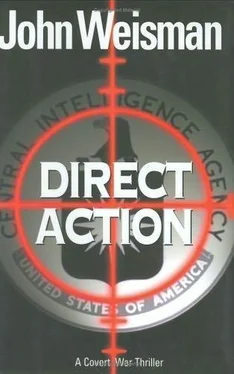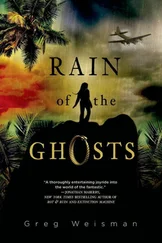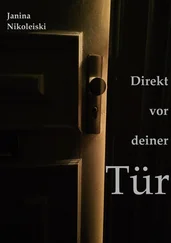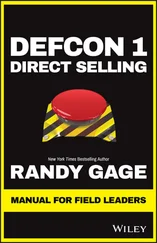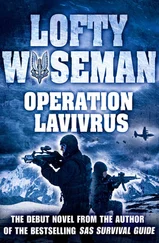Attaché case in hand, Reuven headed for the jam-packed public restroom. Inside, he bypassed the stinking urinals and the open-stall, hole-in-the-floor toilets, slipped half a dozen small coins into the attendant’s palm, and was passed through into the first-class section. There, in a stall smelling of disinfectant, he stripped off his gray shirt and black trousers, quickly turned them inside out, and pulled them back on. He was now dressed in a blue shirt and brown pants. He pulled the black skin off his briefcase and flushed it down the toilet. Underneath, it was utilitarian brown Samsonite. He pulled the toupee off and stuffed it into the case. In less than a minute, he’d changed his silhouette, his physical appearance, and his coloration.
Reuven exited the stall. He walked out of the lavatory, cut through a crowded passageway, slipped out the side entrance to the station, flagged down a cab that had just dropped off a trio of tourists, and ordered the driver to take him to the Egyptian spice bazaar in the Eminönü port district. There, Reuven disappeared into the crowded, narrow streets for an hour-long cleaning route.
Once his instincts told him he was in the clear, the Israeli found another taxi and took it to the airport. Just inside the terminal, he went into a restroom and slipped the toupee back on, so he and his passport picture would be identical. Then he bought a round-trip ticket to Frankfurt, paying with an American Express platinum card, and made his way through immigration control to the departure lounge. Reuven’s passport and papers identified him as a French businessman named Jean-Pierre Bertrand.
“Jean-Pierre Bertrand” exited the Rhine-Main airport and caught an express train to the small, bourgeois city of Koblenz, some fifty miles north. There, he checked into the Holiday Inn, made a phone call to one of his longtime local contacts, then napped for two hours. At seven, he called a cab that drove him to a fish restaurant called Loup de Mer, where he had a piece of grilled plaice, a radish salad, and a mediocre half bottle of Pfaltz. When he’d finished, he paid the bill, left the restaurant, and walked around into the alley. It was deserted. Reuven bent down, reached behind the garbage cans next to Loup de Mer’s service entrance, and extracted a small, rectangular package. Then he quickly made his way back to the hotel. He slipped the wrapped package into his attaché.
Thursday, still using the Bertrand alias, Reuven rented a big, fast BMW 5000 series from Hertz. He drove west at breakneck speed down the Moselle Valley to Trier and crossed the border into Luxembourg, then France. From Thionville he drove south to Metz, a small industrial city in Lorraine. He parked in a municipal lot and spent an hour shopping, first for a suitcase and a dopp-kit, which he stored in the BMW’s trunk, and then clothes-slacks, a black blazer with silver buttons, two shirts, two sets of underwear and socks-as well as an old-fashioned double-edged razor and some other sundry toilet items. Everything was packed carefully in the suitcase. Then Reuven got into the BMW and drove four blocks to the Hotel Cathédrale. He gave the car keys to the doorman and watched as a bellboy carried the suitcase to the registration desk.
Once inside his room, Reuven removed the matchbook sewing kit from the nightstand drawer. From the toilet articles he’d bought, he thumbed a double-edged razor blade from its holder. First he removed all the tags from the items he’d bought. Then he used the blade to carefully slit the lining of the inside breast pocket of the blazer. An hour or so later, he’d created a second, hidden pocket behind the original one.
At seven the next morning, Reuven checked out, paying cash. He wound his way out of town, found the A31 highway. A31 intersected with the toll road that led to Dijon, roughly two hundred kilometers to the southwest. Reuven arrived in Mustard City shortly after 8:30, turned the car in, walked to the railroad station, bought a ticket on Friday’s 8:30 TGV 20to Paris, and hoisted the suitcase and attaché into one of the daily coin lockers.
For two hours he played tourist. He ambled through the Beaux Arts museum in the Palais des Ducs, admiring the Manets, the Courbets, and the Old Masters. He wandered down the rue de la Préfecture to the Notre Dame church, then walked behind the thirteenth-century Gothic masterpiece to Dijon’s historic old marketplace. He ate a simple lunch of escargots, steak, frites, and green salad all washed down by a half-liter pichet of vibrant, young Côtes de Beaune at a crowded bistro in the market.
At 3:30, he visited a series of working-class bars, smoking Gauloises and sipping rouge de table until he spotted the targets he was looking for. Over the next four hours, the Israeli picked a total of four pockets at half a dozen bars. Less than an hour after he’d scored his final wallet, he was riding the TGV to Paris. The dozen or so items he’d removed from the stolen wallets were secure inside his hidden blazer pocket.
He arrived just after ten Friday night. By eleven, he’d opened the triple locks on the safe-house door, checked the clandestine intrusion devices to make sure no one had made surreptitious entry, poured himself two fingers of Napoleon cognac, then stood under the shower for fifteen minutes until the hot water ran out. He dried off, then wrapped the oversize bath sheet around himself like a toga.
Thus clad, he opened the package he’d retrieved in Koblenz. It contained a sterile Glock model 26 semiautomatic minipistol with a pair of extended, threaded barrels and a second firing pin in a small plastic baggie. Wrapped separately were a short cylindrical suppressor, two ten-round magazines, and a box holding fifty 147-grain subsonic frangible hollow-point bullets in 9mm Luger, similarly untraceable.
Mossad and other Israeli black-ops units were known to employ Beretta single-action.22-caliber pistols. CIA historically favored Browning High Power 9mms. In 1992, Reuven had used a Browning to assassinate the PLO’s intelligence chief Atif B’sisou. And indeed Reuven’s choice of weapon created some initial confusion over the identities of the perpetrators because the Mossad combatant had had the foresight to use an agent of influence who made sure DST knew B’sisou was suspected by CIA, which had recruited him in 1983, of being a double agent.
Reuven understood that the 4627 organization followed CIA’s ground rules: it did not approve of its personnel carrying weapons except in the most extreme of circumstances. It was, the Israeli thought, a naive policy, especially in the largely hostile post-9/11 world. In Israel, Reuven went armed all the time. And for years, he’d made sure that he always had access to weapons when he was overseas, even if he didn’t carry them on a daily basis. The pistol and its accoutrements ensured that Paris would not be an exception.
Besides, the Glock itself gave him an added layer of deniability-both with the authorities and with his current employer-should the need to use it arise. Glocks were favored these days by many black-operations units, including Brits, Americans, Egyptians, and Jordanians. The pistol and its accoutrements went into a safe concealed in the parquet flooring beneath an Oriental carpet.
Saturday morning, Reuven awoke at six. By seven, he had pulled the stolen ID cards out of his blazer pocket, switched on the computer and the color laser printer, found the lamination kit and plugged it in, then spent the next thirty hours crafting a series of new identities for himself and Tom.
8:03A.M. Tom rapped on the wood door.
It opened and a stranger peered out “Bonjour, monsieur. Entrez, s’il vous plaît.”
“Jeezus.” Reuven was a bloody chameleon. The man had totally changed his appearance. The beard was gone and the mustache trimmed down to a narrow line that ran a quarter-inch above his upper lip. There was none of the heavy jewelry-only a thin gold chain from which dangled a small golden cross. The bouffant black hairpiece had been exchanged for a short-cropped brown toupee that gave Reuven a decidedly Gallic yet surprisingly Levantine appearance. He might be French, he might be Lebanese.
Читать дальше
